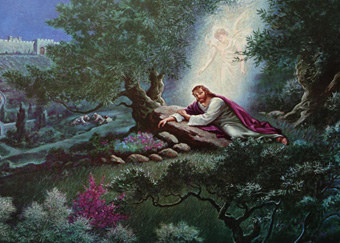We do not mourn like people without hope
Alan Keyes
 I recently read an explanation of the reason why the fasting and self-denial characteristic of the Lenten season does not extend to Holy Saturday. Christ's Apostles were in mourning after His death. Though faithful, they were only human, and felt the deep sense of loss the death of a loved one usually brings upon us. But we who have encountered and been transformed by the Risen Christ live in certain expectation of rejoicing. We do not mourn like people without hope. We know that "Weeping may endure for a night, but joy comes in the morning" (Psalm 30:5).
I recently read an explanation of the reason why the fasting and self-denial characteristic of the Lenten season does not extend to Holy Saturday. Christ's Apostles were in mourning after His death. Though faithful, they were only human, and felt the deep sense of loss the death of a loved one usually brings upon us. But we who have encountered and been transformed by the Risen Christ live in certain expectation of rejoicing. We do not mourn like people without hope. We know that "Weeping may endure for a night, but joy comes in the morning" (Psalm 30:5).
This is why, despite the somber challenges of our times, we finish Lent "trusting in the sign of true hope that is the Cross, raised up with Christ upon it as the prelude to the Rising Son, by which it is, and was, and ever will be proven Hope, fulfilled." For we know with faithful certainty what the Apostles had yet to experience as they mourned the death of Christ upon the Cross. We have within us the living proof that, risen from the dead, He brings transforming grace and newness of life, open to all who accept and love Him as their way, and truth, and life.
On account of this certain faith, the somber day of Christ's crucifixion bathes nonetheless in the light of God's promise: His mercy revealed, His love for all the world of his Creation verified, even unto the forgiveness of sin: "He was wounded for our transgression, he was crushed for our iniquities, upon him was the chastisement that brought us peace, and with his wounds we are healed" (Isaiah 53:5).
As we look upon Christ this Holy Week, we cannot but think of Christians now suffering throughout the world in the recurring and deepening persecution of our faith. We cannot help but see in the atrocious taking of their innocent lives the image of His life, all innocent. We cannot help but remember Him, seeing them cut with envious stripes by workers of iniquity, wounded unto death by self-righteous executioners claiming for the sake of their unmerciful god to renew upon us the external bondage of the law that Christ revealed, once and for all, to have no meaning but for our salvation.
Could it be that, like the executioners of Christ, they know not what they do? Could it be that we should raise our prayers for them, as Christ did from the cross, beseeching God's forgiveness, "for they know not what they do"? These persecutors do not know that every Christian martyr is a witness to them of truth, a portal for the grace that St. Paul tells us Christ announced to him. But we can pray that by the faithfulness of Christ, repeated in the faithful martyrs' lives, and sufferings and death, grace will "open their eyes, that they may be converted from darkness to light and from the power of Satan to God..." (Acts 26:18).
 Knowing as we do, within, that resurrected life which has conquered death, why should we hopelessly lament, even in the face of horrors inflicted upon the body of Christ throughout the world? Death still is conquered, through Christ in us, by God with us (Immanuel), and so where and whatever his faithful people suffer who witness for God's truth, throughout the world, there is victory.
Knowing as we do, within, that resurrected life which has conquered death, why should we hopelessly lament, even in the face of horrors inflicted upon the body of Christ throughout the world? Death still is conquered, through Christ in us, by God with us (Immanuel), and so where and whatever his faithful people suffer who witness for God's truth, throughout the world, there is victory.
For all the grisly terrors of the earth, Christ is Risen! For all the seeming triumphs of the worst, Christ is Risen! For all the deep confusion of the times; the weary, and the hopeless, and the lost, Christ is Risen!
And so, receiving Him within our hearts; making His will and mind and heart our own, we rise with Him from death to life, from tears to joy, from fear to courage. It is courage rooted in the certain, mighty endowment of the Lord our God, whose love for us began with Creation itself. It will endure through life and seeming death – beyond all things but the everlasting peace and joy of His Spirit's communion with us, and our communion with Him, in Jesus Christ our Lord.
Keep Faith,

Ambassador Alan Keyes
Honorary Chairman, RenewAmerica
April 5, 2015
 I recently read an explanation of the reason why the fasting and self-denial characteristic of the Lenten season does not extend to Holy Saturday. Christ's Apostles were in mourning after His death. Though faithful, they were only human, and felt the deep sense of loss the death of a loved one usually brings upon us. But we who have encountered and been transformed by the Risen Christ live in certain expectation of rejoicing. We do not mourn like people without hope. We know that "Weeping may endure for a night, but joy comes in the morning" (Psalm 30:5).
I recently read an explanation of the reason why the fasting and self-denial characteristic of the Lenten season does not extend to Holy Saturday. Christ's Apostles were in mourning after His death. Though faithful, they were only human, and felt the deep sense of loss the death of a loved one usually brings upon us. But we who have encountered and been transformed by the Risen Christ live in certain expectation of rejoicing. We do not mourn like people without hope. We know that "Weeping may endure for a night, but joy comes in the morning" (Psalm 30:5).This is why, despite the somber challenges of our times, we finish Lent "trusting in the sign of true hope that is the Cross, raised up with Christ upon it as the prelude to the Rising Son, by which it is, and was, and ever will be proven Hope, fulfilled." For we know with faithful certainty what the Apostles had yet to experience as they mourned the death of Christ upon the Cross. We have within us the living proof that, risen from the dead, He brings transforming grace and newness of life, open to all who accept and love Him as their way, and truth, and life.
On account of this certain faith, the somber day of Christ's crucifixion bathes nonetheless in the light of God's promise: His mercy revealed, His love for all the world of his Creation verified, even unto the forgiveness of sin: "He was wounded for our transgression, he was crushed for our iniquities, upon him was the chastisement that brought us peace, and with his wounds we are healed" (Isaiah 53:5).
As we look upon Christ this Holy Week, we cannot but think of Christians now suffering throughout the world in the recurring and deepening persecution of our faith. We cannot help but see in the atrocious taking of their innocent lives the image of His life, all innocent. We cannot help but remember Him, seeing them cut with envious stripes by workers of iniquity, wounded unto death by self-righteous executioners claiming for the sake of their unmerciful god to renew upon us the external bondage of the law that Christ revealed, once and for all, to have no meaning but for our salvation.
Could it be that, like the executioners of Christ, they know not what they do? Could it be that we should raise our prayers for them, as Christ did from the cross, beseeching God's forgiveness, "for they know not what they do"? These persecutors do not know that every Christian martyr is a witness to them of truth, a portal for the grace that St. Paul tells us Christ announced to him. But we can pray that by the faithfulness of Christ, repeated in the faithful martyrs' lives, and sufferings and death, grace will "open their eyes, that they may be converted from darkness to light and from the power of Satan to God..." (Acts 26:18).
 Knowing as we do, within, that resurrected life which has conquered death, why should we hopelessly lament, even in the face of horrors inflicted upon the body of Christ throughout the world? Death still is conquered, through Christ in us, by God with us (Immanuel), and so where and whatever his faithful people suffer who witness for God's truth, throughout the world, there is victory.
Knowing as we do, within, that resurrected life which has conquered death, why should we hopelessly lament, even in the face of horrors inflicted upon the body of Christ throughout the world? Death still is conquered, through Christ in us, by God with us (Immanuel), and so where and whatever his faithful people suffer who witness for God's truth, throughout the world, there is victory.For all the grisly terrors of the earth, Christ is Risen! For all the seeming triumphs of the worst, Christ is Risen! For all the deep confusion of the times; the weary, and the hopeless, and the lost, Christ is Risen!
And so, receiving Him within our hearts; making His will and mind and heart our own, we rise with Him from death to life, from tears to joy, from fear to courage. It is courage rooted in the certain, mighty endowment of the Lord our God, whose love for us began with Creation itself. It will endure through life and seeming death – beyond all things but the everlasting peace and joy of His Spirit's communion with us, and our communion with Him, in Jesus Christ our Lord.
Keep Faith,

Ambassador Alan Keyes
Honorary Chairman, RenewAmerica
